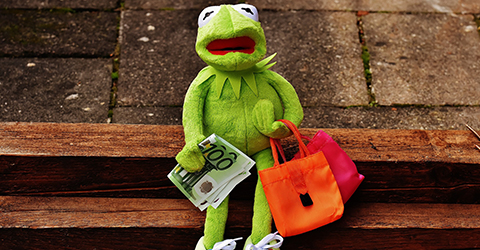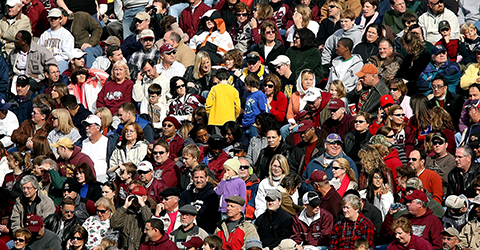While I am writing these lines global markets are plummeting. After a few days of rising prices, market participants right and left have decided that the fears associated with a possible slowdown in China’s economy are back. That, as said, after the short-lived hiatus when the market jumped a few percentage points as if the world economy was blossoming again.
Did the fear over China go away? Of course not. Are we really looking at substantial economic issues? Debatable; China’s growth might be slowing, but double digit growth was unsustainable and unrealistic over the long term anyway. First and foremost, how is it possible that while the markets rebounded after last week’s crash, today shows yet another big fat red minus? It is, amongst other phenomena, investor strategy: Cash in while the prices are high, buy when the prices have dropped.
Secondly it is also investor psychology: Human behaviors that can similarly be observed during any of the annually big shopping and retail sales events.
Here are the ten things market reactions and shopping frenzies have in common:
1. Panic
We have all seen images of shoppers queuing outside the local department or electronics store the moment Black Friday hits. Panic breaks the moment the clicking of the door is heard and punters realize that their longed for good is only steps away. In fact the level of panic and related behavior have led some retailers to introduce measures intended to reduce potential mishaps.
Similarly, a number of measures have been introduced over the years that limit certain stock market trading techniques. Most recently, China implemented measures to limit the ability of large market participants to sell their stocks and has even stopped trading all together on certain days when panic reigned the markets.
Panic is a human reaction to something uncertain and if you can help it step aside, let the others panic and then reflect on your next steps. Imagine a stampede of people trying to run towards the exit. The last thing, and certainly unsafest, is for you to be caught in the middle. The best thing is to stand at some distance safely to the panic and observe and then react rationally.
2. Irrational behavior
Related to the panic are the behaviors that are associated with it. Humans (but also animals) react to uncertainty and group movements such as panic with little to no rationality. For there is little time to reflect on the situation when seeing masses of people running towards you or seeing the stock prices fall or shoot up. In either scenario only the cautious observer is able to make a rational decision.
 We were in Dubai over New Year’s and experienced first hand the level of irrational behaviors originate in crowd movements and panic. The result is tremendously dangerous. Anyone who has been to Dubai knows that only two metro lines run through Dubai and while they are fantastic, clean, and really reliable, they were simply too little to cope with the masses. While our trip to Burj Kalif was already an experience, it was the journey back to the hotel that was evidence to the irrational human behavior when masses gather and gain momentum. Despite the vastness of the metro station, at one point there must have been over a thousand people pushing towards the platform. Primarily men, it became extremely dangerous with those in the back pushing forward, squeezing those in the front and leaving little space to breathe. Luckily the authorities ensured that families and women were allowed through first to protect them from the brutal physical force that had now developed. At one point a man behind me pushed forward and into my back. My natural reaction was to try and reason with him about the dangers of everyone doing so. It took him about half a minute to, while clearly not happy, abstain from pushing and calm himself. However, if I had reacted with panic rather than calm, he may potentially turned from unhappy to aggressive. And this is where the dangers in these situations lie. Rather than viewing a situation rationally, too often people fall into an irrational behavioral trap. Once the masses gain momentum, these behaviors lead to catastrophes.
We were in Dubai over New Year’s and experienced first hand the level of irrational behaviors originate in crowd movements and panic. The result is tremendously dangerous. Anyone who has been to Dubai knows that only two metro lines run through Dubai and while they are fantastic, clean, and really reliable, they were simply too little to cope with the masses. While our trip to Burj Kalif was already an experience, it was the journey back to the hotel that was evidence to the irrational human behavior when masses gather and gain momentum. Despite the vastness of the metro station, at one point there must have been over a thousand people pushing towards the platform. Primarily men, it became extremely dangerous with those in the back pushing forward, squeezing those in the front and leaving little space to breathe. Luckily the authorities ensured that families and women were allowed through first to protect them from the brutal physical force that had now developed. At one point a man behind me pushed forward and into my back. My natural reaction was to try and reason with him about the dangers of everyone doing so. It took him about half a minute to, while clearly not happy, abstain from pushing and calm himself. However, if I had reacted with panic rather than calm, he may potentially turned from unhappy to aggressive. And this is where the dangers in these situations lie. Rather than viewing a situation rationally, too often people fall into an irrational behavioral trap. Once the masses gain momentum, these behaviors lead to catastrophes.
Whether it is overselling during downturns in the stock markets or in a metro station, it takes strength to react differently and calm.
3. Feelings of anxiety (bear market)
It is these situations that lead us to anxieties. Anxieties that we might be the one left out or the last one to jump the ship. During Lehman Brothers, anxiety of the world collapsing was the dominant sensation. I also found myself anxious about the events that may unfold each morning. Could the situation get even worse?
When I was stuck in the metro I became extremely anxious. A feeling of survival instinct kicked in. I tried to protect Mrs. CF from the pressure from the crowd pushing while trying to control my own emotions of feeling absolutely stuck and with nowhere to go. And while a situation like that might indeed turn life threatening, we need to always remember that anxieties related to the economy are usually unfounded and short lived. Whether a stock falls or not, eventually, if you have done your research and chosen a good investment, the stock will rebound and anxiety will be replaced by happiness.
4. Feelings of missing out (in bull markets)
A similar emotion frequently occurs in bull market runs. Like with everything good in life, we don’t want to miss out on something that can make us richer or add something positive to our lives.
The reason for these mad Black Friday runs with people pushing others aside, loading up their trolleys with multiple TV sets and buying more than they’d ever would if the psychological phenomenon stemming from the apparent “too good a deal to pass up” was not artificially created by retailers. Punters don’t want to miss out on this fantastic looking deal.
Similarly when people see a share or the market rallying, they might put money into a share that they would otherwise never have bought. Only because they don’t want to miss out. But just like the second or third TV set, it may sometimes make sense to step back and let events take their course.
5. Feeling of losing control (in bear markets)
As a species, humans generally hate not being in control. When we are confronted with events that we have no control over, we feel helpless, look for anchors or safe havens, and seek advice.
When an investment turns sour and we have to watch value diminish, it is too easy to having to endure the feeling of lost control.
Shopping frenzies are marked by many running around a store like headless chickens. When someone grabs the longed for item right in front of one’s eyes and walks away, an adrenaline rush runs through our body. The adrenaline will activate one or both of the following reactions: fight or flight.
While during a shopping frenzy the opponent stands right in front of us and we might take to fighting over the product, in bear markets our opponent(s) is much larger and anonymous. In fact, the adrenaline too often triggers the decision to flee the market. When we no longer feel in control over our own destiny we turn to what we consider the safest option.
Ask any property owner who is wanting to sell their asset. When things are good people occasionally experience a feeling of having to cash in now for the market might turn against them. If property prices are falling and you are forced to sell, the feeling of not being in control can lead to sleepless nights and rushed decisions: instead of renting out your property, selling for too little. But whether this is indeed the best option is unclear. Thus, when you are overcome by the adrenaline rushing through your body, step back or even entirely away before considering your next move. The feeling of losing control only leads us to make rushed decisions that might or might not be the smartest move.
 6. Herd behaviors
6. Herd behaviors
Just because everyone else does it, doesn’t mean it’s the best option. Consider those Black Friday sales. Sure you might get a fantastic discount, but if you have to queue for hours to even enter the store and fight over a product, is it really worth it? It’s human nature to look to others for direction, but that does not mean the herd knows the way. History has told us numerous times that choosing an individual way is oftentimes the better option, as herd behavior leads to people failing to take responsibility for their own actions and forgetting about the most important thing: their own goals, destiny, and wellbeing.
What if you simply waited for the sales to be over and then smartly search for an even better deal that is not driven by a mad shopping frenzy and heard behaviors?
This applies in bear as well as bull markets. Just because everyone is behaving in a certain way does not make an investment a good investment. Just look at properties. For years people were over their heads in mortgages struggling to repay the monthly installments. Everyone bought property so it must be good, right? Just because everyone else does it, however, does not mean you should. Maybe many of those do have the cash to buy a property outright rather than getting a mortgage or have bought for a much lower price. Herd behavior should never drive our own decisions. Be your own boss.
7. Great deals might come expensive
You know that great deal that is so irresistible? A deal that is only on offer for a short time? How often did you see the same product for an even better discount a short time later? But by creating that pressure that if you don’t snap up that deal now, you are missing out on a fantastic opportunity, retailers are able to create a sense of urgency of Now or Never.
The same can too frequently happen to the more inexperienced investor. If something looks too good to be true, it probably is. If you see something that is currently traded at a massive discount, whether share, bond, property, or any other type of investment, be cautious. I am not referring to investments you have been following for some time and are certain that now is the right time to buy. It is deals that pop up out of nowhere, like those properties that are offered with a bold headline Buy now before it is gone.
Companies sometimes offer amazing dividends with yields significantly above the market average. While these might look fantastic at first glance, make sure you do some digging. There might be a reason for why these high dividends are offered. The company could be in dire need of new money and investments and the mid-term benefits to you are rather slim.
Or a stock that appears an opportunity too great to pass up such as a major European telecommunications company a few years ago. A national treasure at the time that turned out only months later into a rather sour investment to those who bought into the hype. If you were to buy that company now, you’d enjoy a much better return. So make sure that apparently great deal does not come expensive.
8. Don’t be overwhelmed
Just like those massive retail sales lead you to spending too much, an investment frenzy can take similar shape. You went in for a TV set and ended up buying an Iphone and two Ipads as well? That’s exactly why the retailer put on this massive sales event; to get you into the door and overspend.
The stock market does not care whether you buy one or two thousand shares. It is a market after all. What may happen, however, that once you start buying or selling, you end up going overboard. Make sure that once the market has got a firm grip on you, you stick to your initial investment plan. Only buy as many shares for the price you intended. Don’t put in an extra few thousand just because it now seems such a fantastic opportunity. Only put in the money you can afford and not a single extra penny. Remain an investor with a clear head and don’t become overwhelmed what might in that split second seem like a fantastic deal.
 9. You can anticipate discounts
9. You can anticipate discounts
Whether bull or bear markets, Christmas or Easter sales, it is some sort of period or psychological point where people start selling or buying. Every year November, early December retailers put on some sort of special sales event, such as the Black Friday frenzy. You don’t have to be a psychic to know that as early as midnight eager customers start queuing to be the first in line to grab a discounted television set or new smartphone. Before the day is over, stressed customers call themselves proud owners of just another TV set and retailers are counting the cash.
It’s no different in the stock market: After roughly seven years the bears gain ground, share prices fall, panic prevails, and within a few months all is over and the bulls again commence to drive share prices to new heights. But you don’t even have to wait that long, a war in the Middle East, a few wrong words spoken by the FED chair or the ECB president and the market will offer wonderful discounts. Stock market participants even coined their own slogans: retailers have their ‘Black Friday Sale’, investors ‘Sell in May and go away’.
10. Don’t worry, another one is just around the corner
If you feel that you have missed out on last week’s great sale, don’t despair, another one is just around the corner. Just like there is not just Black Friday, Christmas, Easter, or whatever else sale, there is not only this one opportunity to invest in the stock market, in properties, or whatever asset tickles your fancy.
Remain calm and clear headed, have a plan and strategy, stick to it, be flexible but with caution, and don’t become a market frenzy victim.